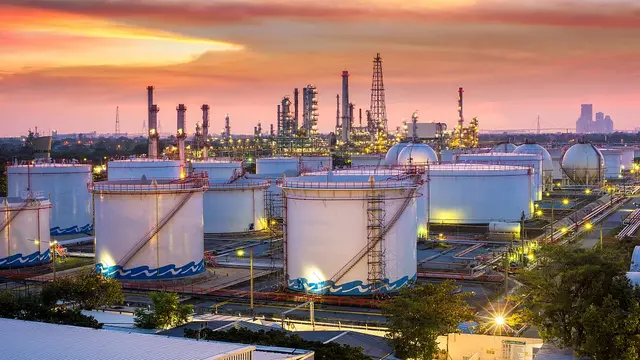
VCG
Oil prices bounced back by seven percent on Tuesday after plunging by a quarter the previous day. The volatility was felt by China's oil industry, while opportunities are seen by its refineries.
The price war launched by Saudi Arabia and Russia has sent shockwaves across the energy industry and led to the biggest sell-off in more than a decade on Monday.
Li Li, China head of analytics with ICIS, a global commodity intelligence provider, attributed the plunge in oil prices to intensified panic in the market.
"As the coronavirus spreads, the market is increasingly worried about the economic shock it brings and whether it will trigger a recession," Li said.
OPEC+'s attempt to limit supply fell apart on Friday and has exacerbated the fear of excesses in the crude oil supply, she added.
The International Energy Agency (IEA) said oil demand was set to contract in 2020 for the first time since the financial crisis in 2009.
Feeling the volatility of international crude oil market, prices of China's oil and gas extraction industry dropped by 11 percent from a 4.3-percent increase in January. Prices of oil, coal and other fuel processing industry fell by 4.4 percent from 1.8 percent in January. The country's producer price index (PPI) fell by 0.4 percent in February from a year earlier, official data showed on Tuesday.
From a micro level, plunge in oil prices might benefit crude oil importers and refineries, Li said. Small local refineries can take the opportunity in obtaining raw materials at a low-cost and generate refining revenues to make up for the losses resulted from factory shutdowns in February.
Oil demand has been hammered by a collapse in demand due to the coronavirus outbreak. China has temporarily halted travel and economic activity in an effort to contain the virus. IEA estimated that China's oil demand dropped 1.8 million bpd in the first quarter, while the global demand fell by around 2.5 percent at 2.5 million bpd.
The World Health Organization said that the COVID-19 outbreak in China has peaked and leveled off in early February. The country has reported 19 more confirmed cases of the disease in the Chinese mainland as of midnight on Monday, recording the third consecutive day of zero new cases domestically outside Hubei Province, signaling a cooling off from the epidemic.
China's crude oil imports should hit the ground in March, while a pronounced rebound can be expected in April and May, Li predicted.
In an earlier interview with CGTN, Sero Qu, senior research fellow from Shanghai Petroleum and Natural Gas Exchange predicted oil prices will still tumble in the short term before bouncing back in the third quarter when the demand would traditionally go up and central banks' eased monetary policies will show effect.
Strategic choice rather than a 'price war'
Li reckons that the main way to alleviate short-term surplus would be for certain scale of production to withdraw from the market, whether it is Saudi Arabia or Russia to cut output, or bankruptcy of some small and medium shale oil producers in the United States, she added.
The move should help restore some market confidence and lift oil prices out of the current extreme range, Li said.
"We should not rule out that Saudi Arabia and Russia will launch a cooling-off period and allow the adverse effects of the epidemic to be exhausted before considering joining forces to stabilize oil prices," Li cautioned.
"This is a strategic choice in the short term. I don't think it's a deliberately launched price war, because in the long run, the price war will damage both sides," she said.
 简体中文
简体中文

